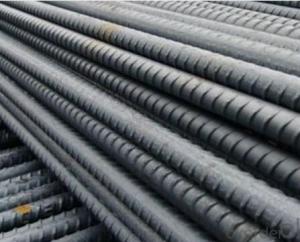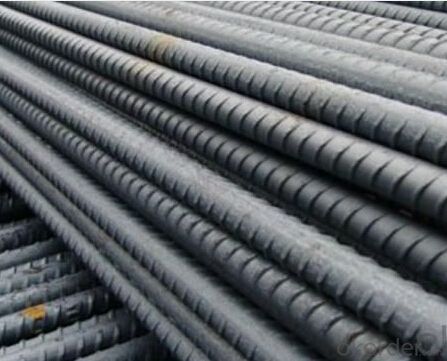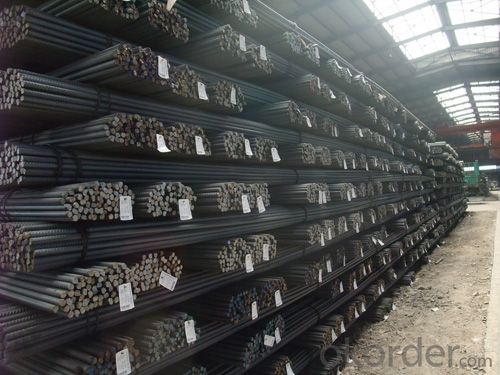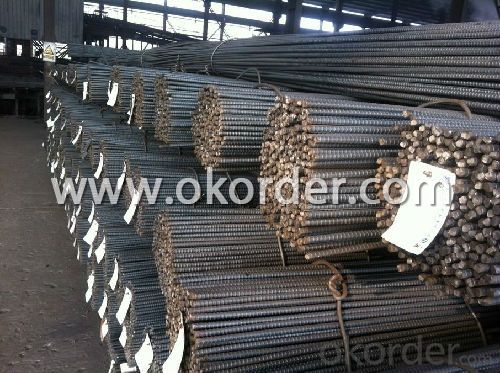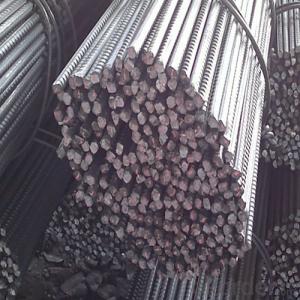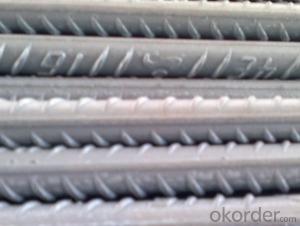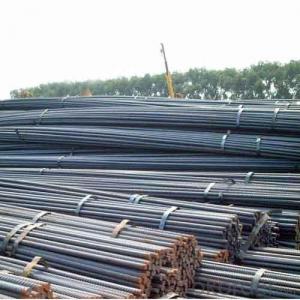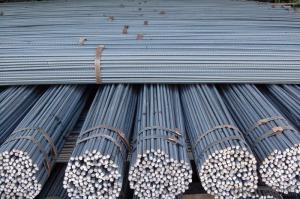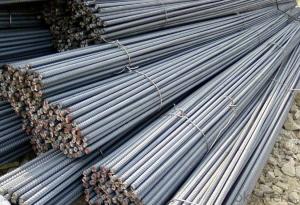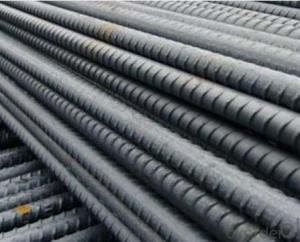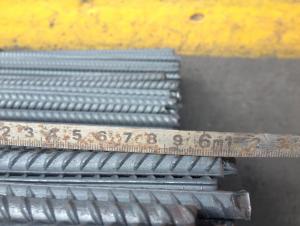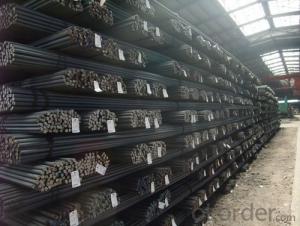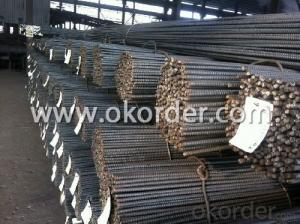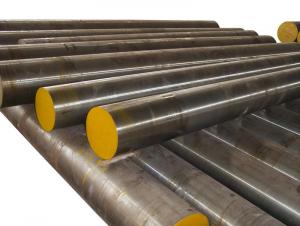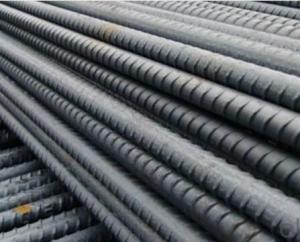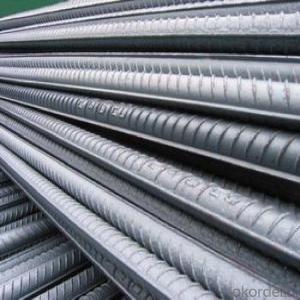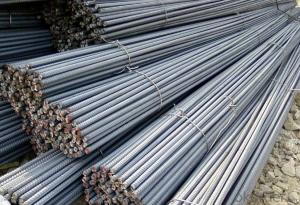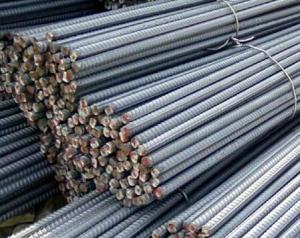HIGH QUALITY DIN STANDARD HOT ROLLED STEEL REBAR
- Loading Port:
- Tianjin
- Payment Terms:
- TT OR LC
- Min Order Qty:
- 50 m.t.
- Supply Capability:
- 100000 m.t./month
OKorder Service Pledge
OKorder Financial Service
You Might Also Like
Product Description:
Specifications of Hot Rolled Steel Rebar:
The production process of Steel Rebar
1-Waling beam furnace 2-Roughing rolling group 3-Intermediate rolling train
4-Finishing rolling group 5-Water-cooling device 6-Walking beam cooler
7-Finishing equipment(including the cold scale shear,short feet collection system,
automatic counting device,bundling machine, collect bench)
Usage and Applications of Hot Rolled Steel Rebar:
Deformed bar is widely used in buildings, bridges, roads and other engineering construction. Big to highways, railways, bridges, culverts, tunnels, public facilities such as flood control, dam, small to housing construction, beam, column, wall and the foundation of the plate, deformed bar is an integral structure material. With the development of world economy and the vigorous development of infrastructure construction, real estate, the demand for deformed bar will be larger and larger..
Packaging & Delivery of Hot Rolled Steel Rebar:
Packaging Detail: products are packed in bundle and then shipped by container or bulk vessel, deformed bar is usually naked strapping delivery, when storing, please pay attention to moisture proof. The performance of rust will produce adverse effect.
Each bundle weight: 2-3MT, or as required
Payment terms: TT payment in advance or Irrevocable LC at sight.
Trade terms :FOB, CFR, CIF
Label:to be specified by customer, generally, each bundle has 1-2 labels
Note:
1. Our products are produced according to national standard (GB), if not, supply according to national standards (GB) or agreement as customer required.
2. Other Grade and Standard Deformed Steel Bar we can supply:
Grade: GR40/GR60, G460B/B500A/B500B/B500C,BST500S
Standard: ASTM, BS, DIN
The Minimum Order Quantity of these products is high, and need to be confirmed.
3. We can not only supply Deformed Steel Bar; if you need anything about building materials, please contact us for further information.
4. Please send us your detail specifications when inquire. We will reply to you as soon as possible. We sincerely hope we can establish a long stable business relationship.
- Q: How are steel rebars protected against galvanic corrosion in concrete?
- Steel rebars are protected against galvanic corrosion in concrete through the use of various methods such as applying epoxy coatings, using corrosion inhibitors, cathodic protection, and ensuring proper concrete cover. These measures help to prevent the direct electrical contact between the rebar and the concrete, thereby minimizing the risk of galvanic corrosion and maintaining the structural integrity of the reinforced concrete.
- Q: Are steel rebars suitable for use in structures with high resistance to chemicals?
- Steel rebars are generally not suitable for use in structures with high resistance to chemicals. While steel is a strong and durable material, it is susceptible to corrosion when exposed to certain chemicals. Chemicals such as acids, alkalis, and chlorides can cause steel rebars to corrode, which can compromise the structural integrity of the building or structure. To ensure high resistance to chemicals, alternative materials such as stainless steel rebars or fiber-reinforced polymer (FRP) rebars are often used. Stainless steel rebars are more resistant to corrosion than regular steel rebars due to their higher chromium content. FRP rebars, on the other hand, are non-metallic and do not corrode, making them a suitable choice for structures exposed to harsh chemical environments. Ultimately, the choice of rebars in structures with high resistance to chemicals depends on the specific chemicals involved and the level of exposure. It is important to consult with engineers and experts who can assess the chemical environment and recommend the most suitable rebars to ensure the long-term durability and safety of the structure.
- Q: 25 screw steel, how many meters per meter?
- Ordinary hot rolled steel bars are made up of HRB and the minimum yield point of the brand. H, R, and B are the first letters in English for hot-rolled (Hotrolled), ribbed (Ribbed) and reinforced (Bars) three words.
- Q: Can steel rebars be used in pre-stressed concrete construction?
- Yes, steel rebars can be used in pre-stressed concrete construction. In pre-stressed concrete, steel rebars are commonly used to provide additional strength and reinforcement to the concrete structure. These rebars are placed strategically and pre-tensioned or post-tensioned to withstand the applied loads and enhance the overall performance and durability of the construction.
- Q: What is the process of straightening steel rebars?
- The process of straightening steel rebars involves several steps to ensure the rebars are properly aligned and free from any bends or deformities. Firstly, the rebars are carefully inspected for any visible defects such as twists, kinks, or bends. This initial inspection is important to determine the extent of straightening required and whether any rebars need to be replaced. Once the inspection is complete, the rebars are loaded onto a straightening machine. This machine consists of rotating rollers or hydraulic pressure devices that apply force to the rebars to straighten them. The rebars are fed through the rollers or placed between the hydraulic devices, and pressure is applied gradually to reshape the bars and remove any bends or twists. During the straightening process, it is crucial to maintain control over the applied force to prevent over-straightening or causing any further damage to the rebars. Skilled operators monitor the machine and adjust the pressure accordingly to ensure the rebars are straightened accurately. After the rebars have been straightened, they undergo a final inspection to verify that they meet the required specifications. This inspection includes checking for any remaining deformities, ensuring the rebars are of the correct length, and confirming that they are straight within acceptable tolerances. It is important to note that the straightening process can vary depending on the type and size of the rebars. Different machines and techniques may be used for larger or more complex rebars. Additionally, the process may involve heating the rebars prior to straightening to make them more malleable. Overall, the process of straightening steel rebars involves careful inspection, the use of specialized machinery, skilled operators, and a final inspection to ensure the rebars are straight, aligned, and ready for use in various construction projects.
- Q: What is the recommended method for splicing steel rebars together?
- The recommended method for splicing steel rebars together is typically achieved using mechanical splices or lap splices. Mechanical splices involve connecting two rebars using couplers or sleeves, which are designed to provide strength and stability to the joint. Lap splices, on the other hand, involve overlapping the rebars and securing them together with steel wire or tie bars. The choice of method depends on factors such as the structural requirements, rebar diameter, and construction specifications.
- Q: What is the effect of impurities on the corrosion resistance of steel rebars?
- The corrosion resistance of steel rebars can be significantly affected by impurities. Steel rebars consist primarily of iron and carbon, but varying amounts of impurities like sulfur, phosphorus, and silicon can also be present. One common impurity found in steel is sulfur. When sulfur reacts with water and oxygen, it forms sulfuric acid, which accelerates the corrosion process. This acid attack can cause rebars to deteriorate faster, reducing their overall strength and durability. Another impurity, phosphorus, can have a negative impact on the corrosion resistance of steel rebars. It can promote the formation of localized corrosion sites called pitting, which can lead to the development of rust and eventual structural damage. Although silicon is generally considered beneficial in steel production, excessive amounts can have adverse effects. Higher levels of silicon in rebars can result in the formation of a protective oxide layer. However, this layer can sometimes be porous, allowing corrosive agents to penetrate and cause corrosion. In conclusion, the presence of impurities in steel rebars can compromise their corrosion resistance. It is essential to ensure that construction steel meets specified standards and has minimal impurities. Additionally, proper maintenance and regular inspection of rebars are crucial to identify and address potential corrosion issues before they cause significant damage or structural failures.
- Q: Can steel rebars be used in bridges?
- Yes, steel rebars can be used in bridges. Steel rebars are commonly used as reinforcement in concrete structures, including bridges. They provide added strength and stability to the concrete, making it able to withstand heavy loads and forces. The use of steel rebars in bridges helps to enhance their durability and structural integrity, ensuring the safety of the bridge and the people using it. Additionally, steel rebars have excellent tensile strength, which is necessary to counteract the tensile forces that bridges often experience. Overall, steel rebars are an essential component in the construction of bridges, contributing to their strength, longevity, and safety.
- Q: What is the lifespan of steel rebars in concrete structures?
- The lifespan of steel rebars in concrete structures can vary depending on several factors such as the quality of the steel, the environment in which the structure is located, and the level of maintenance. However, with proper design, construction, and maintenance, steel rebars in concrete structures can typically last for several decades to over a century.
- Q: Are steel rebars susceptible to corrosion?
- Yes, steel rebars are susceptible to corrosion. Corrosion is a natural process that occurs when steel is exposed to moisture, oxygen, and other environmental factors. When steel rebars are used in concrete structures, they are exposed to the elements and can come in contact with water or moisture, which can lead to the formation of rust. This rust can weaken the rebars and eventually compromise the structural integrity of the concrete. To prevent corrosion, various protective measures can be taken, such as applying a protective coating or using corrosion-resistant steel rebars. Regular maintenance and inspection of the concrete structures are also crucial to detect and address any signs of corrosion in a timely manner.
Send your message to us
HIGH QUALITY DIN STANDARD HOT ROLLED STEEL REBAR
- Loading Port:
- Tianjin
- Payment Terms:
- TT OR LC
- Min Order Qty:
- 50 m.t.
- Supply Capability:
- 100000 m.t./month
OKorder Service Pledge
OKorder Financial Service
Similar products
Hot products
Hot Searches
Related keywords
